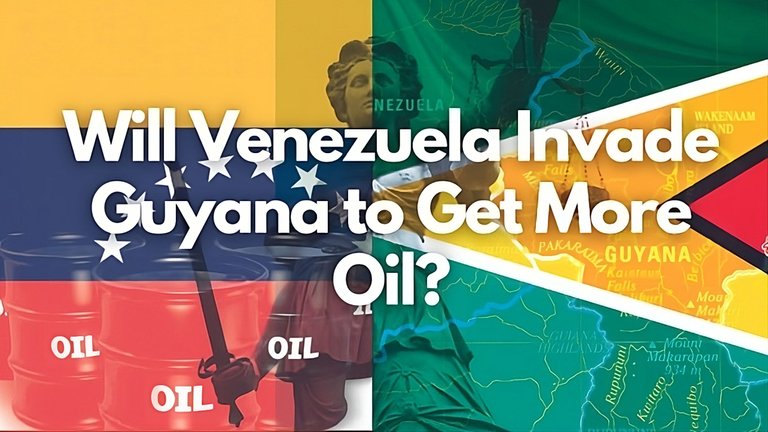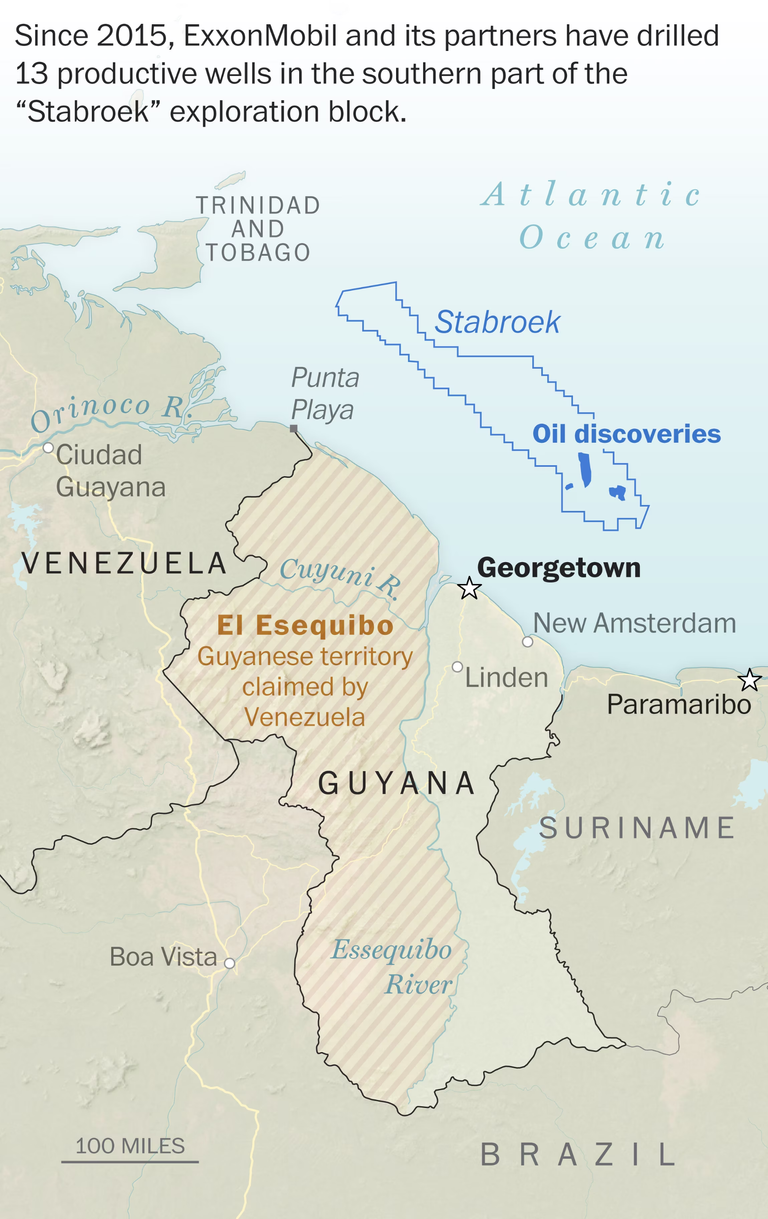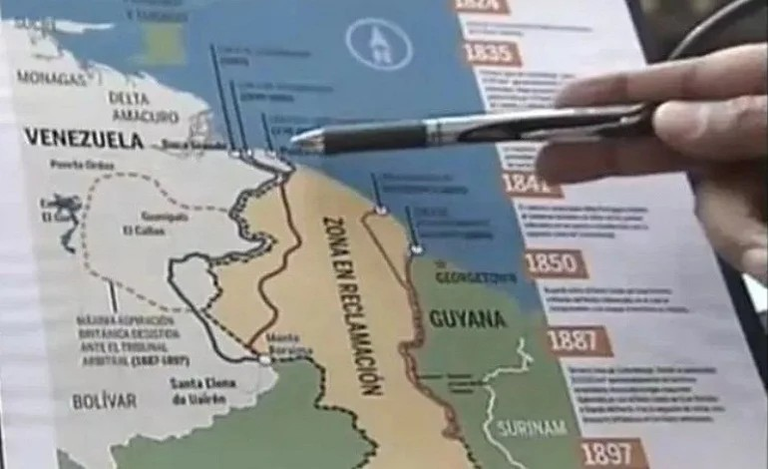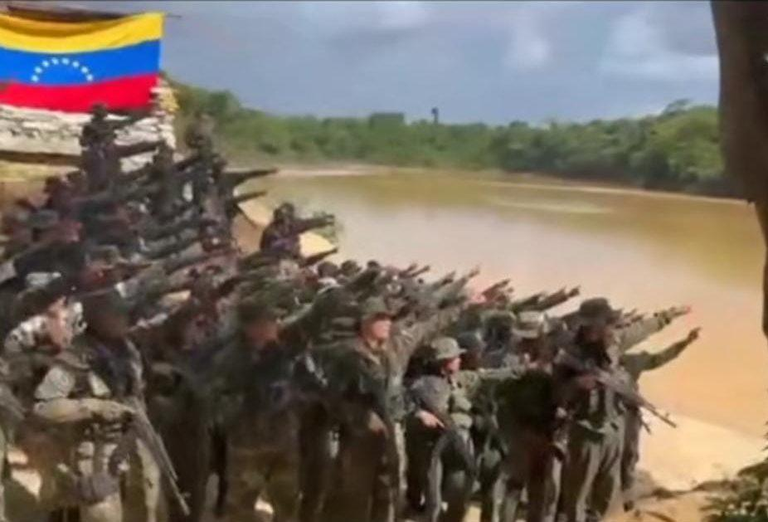
A long running territorial dispute at the north end of South America is reaching a boiling point, with Guyana warning that it faces an existential threat in the form of a referendum in neighbouring Venezuela scheduled for December that Guyanese authorities say is a prelude to annexation. So in this article, we're going to take a look at the territorial dispute, explain Venezuela's planned referendum, why Guyana feels so threatened by it and what could happen next.
The region in question, known as Essequibo, covers nearly 160,000km² to the west of the Essequibo River, which runs south to north, splitting Guyana in two. The area is currently controlled and administered by Guyana despite Venezuela's claim and is actually split into six administrative regions, although some of these regions cover territory on both the west and east side of the river. Essequibo makes up more than two thirds of Guyana's total territory and while population estimates vary, it is thought to be home to around 125,000 of Guyana's 800,000 citizens. Now, the vast majority of Essequibo, like Guyana as a whole, is a dense rainforest, home to rich biodiversity and beautiful natural features but here's the kicker it's also home to a lot of oil located under the seabed off the coast. The first significant discovery of Guyanese oil was by ExxonMobil back in 2015 and since then the small country has become an oil hotspot after a series of further discoveries and major investments in exploration and extraction by oil companies, with the latest significant discovery being just last month.

Guyana currently produces approximately 400,000 barrels of oil per day but expects to ramp up production to 1.3 million barrels per day by 2027, with most coming from the oil rich Stabroek block. Now, perhaps unsurprisingly, this oil boom has sent Guyana's economy soaring but anyway, back to their dispute with Venezuela. As with many territorial disputes, its origins lie in the colonial era. In 1814, the Dutch officially ceded what is now Guyana to the United Kingdom, but the treaty didn't define a western boundary, so in 1840, the British commissioned an explorer to survey and delineate the territory's borders. The line he drew for British Guyana's western border with Venezuela effectively claimed a further 77,000 or so square kilometers of territory beyond what the British occupied at the time. Now Venezuela disputed this line and claimed that the border was actually as far east as the Essequibo River, effectively laying claim to two thirds of the British territory. A gold discovery then quickly raised the stakes of this dispute, and after significant lobbying from Venezuela, the US eventually got involved to pressure the UK into accepting an arbitration of the dispute. So in 1899 the International Arbitration Tribunal ruled largely in favour of the UK, much to the disappointment of Venezuela. However, it did abide by the decision and a new joint UK Venezuela Commission demarcated the boundary in accordance with the ruling.
But fast forward to 1962 and Venezuela declares the 1899 ruling null and void and basically describes it as a stitch up. Four years later, in 1966, Venezuela and the UK came to a new agreement in Guyana that essentially outlines guidelines for a diplomatic resolution to the dispute without validating either claims to the territory. Around this time, Guyana gained its independence from the British, so the dispute was suddenly between Venezuela and a newly independent Guyana. Following this, things rumbled on without much change with the mediation of the dispute falling under the UN secretary general. But things intensified from 2015 onwards when oil was discovered off Essequibo's coast, as Venezuela claimed that Guyana doesn't have the right to explore and exploit oil reserves in the area, with the involvement of American companies like ExxonMobil being particularly offensive to Venezuela. With this dispute rekindled and with little progress towards a mutual settlement over the previous decades, the UN secretary general in 2018 decided to designate the International Court of Justice, or ICJ, as the means of settlement, and Guyana swiftly lodged a case asking for the ICJ to uphold the 1899 ruling. Venezuela, while partially boycotting proceedings, has sought to stop the case from moving forward by arguing that the court doesn't have jurisdiction over the case. However, the ICJ ruled in April of this year that the dispute did indeed fall under its jurisdiction, and the case is ongoing.

However, in a major escalation of this dispute in September, Venezuela's national. National Assembly greenlit a multi-question referendum regarding the territorial dispute, a referendum which is scheduled for the 3rd of December this year. The first question asked Venezuelans if they reject the ruling from 1899 and reject the jurisdiction of the ICJ over the matter, while supporting the 1966 Geneva Agreement as the sole legal instrument to reach a settlement. But the most notable question is the fifth and final one, which asks Venezuelans if they agree with integrating the region as a Venezuelan state, granting citizenship and identity cards to its population, incorporating it into the country's map, and so on. The Venezuelan government is urging its citizens to vote yes on all five questions, and the exact wording of them is clearly designed to push people towards that direction. But these questions, particularly the last one about incorporating Essequibo as a state, have set off alarm bells in Guyana, which has described the referendum as an existential threat to the country, adding that it would pave the way for Venezuela to unilaterally and illegally seize and annex two thirds of Guyana's territory.
The referendum has also drawn condemnation from the Commonwealth, Caricom and the Organization of American States, three organizations which Guyana is a member state of. The Guyanese government has also urged the ICJ to issue an emergency order for Venezuela not to proceed with the referendum. Now the ICJ is yet to respond to this request. However, Venezuela's vice president said of Guyana's request that nothing will prevent the referendum from being held. Now, it's worth pointing out that even if, as expected, Venezuela votes yes to each question, then it wouldn't actually change the reality on the ground. In the immediate term, the region would still be under Guyanese control and the ICJ would still be the ones to make the official ruling. However, the question is what Venezuela does with what it will certainly consider a popular mandate. Due to the timing of the referendum it could also be seen as a move to try and give more legitimacy to Venezuela's claim in the eyes of the ICJ. Additionally, it can be seen as an attempt by Venezuelan government to gauge its own public support ahead of next year's election, while also fomenting irredentist and nationalistic sentiment in order to boost said support and distract from domestic problems.

However, there are also fears of something more sinister. Guyana has denounced the reported deployment of between 150 and 200 Venezuelan troops near the border, which Venezuela say are there as part of an operation against illegal mining. For its part, the Venezuelan ambassador has insisted that the country would never invade Guyana and that there is no intention whatsoever of creating a conflict or something like that. But considering what's at stake, this reassurance is unlikely to settle fears in Guyana.
Oh wow that just might be the trigger for another Mass migration wave up to the United States...
I didn't know things are getting that crazy down there.
Thank you very much for your post and the update!
#freecompliments
As I have explained, this was a long-standing dispute. In Latin American countries, it is quite common for leaders who are about to lose an election to declare war on another country. And their people are always the ones who suffer the greatest damage. For example: The Falkland Island war between Argentina and the United Kingdom.
Thanks mate
I can't argue with that. I just had no idea this was at the severity you show here.
Thank you!